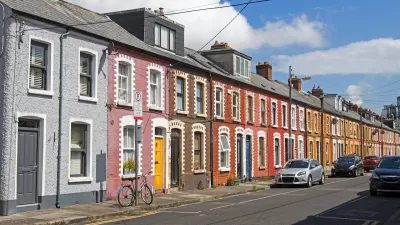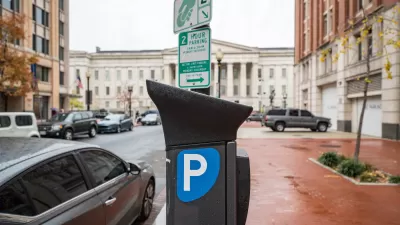Lauded by transit advocates, and garnering attention from cities across America, an experimental car-sharing program in Hoboken has proven effective in dissuading private car use. If only the city's residents were as happy with its success.
In the city of Hoboken, New Jersey, an experimental car-share program called Corner Cars, was inaugurated two years ago with the counterintuitive goal of creating parking spaces by taking them away, reports Matt Flegenheimer.
"At the beginning of the program, 42 of the city's roughly 9,000 on-street spaces were sacrificed to a city car-sharing program," writes Flegenheimer. "As of July 2012, nearly a quarter of the program's roughly 3,000 members said they had given up their cars or decided against buying one because of the car share. Since 2009, the number of people with residential parking permits has decreased by about 1,000, to 16,000 total parking permits."
The residents, however, are not thrilled about the results. "It's taking away parking spaces," said Maria Espinosa, who commutes from Bergen County to her job as a receptionist in Hoboken. "Not everybody's going to use a bicycle like our lovely mayor."
Others see the program as an effective way to make driving a less plausible option. "It's such a smart way to handle a limited resource," says Robert J. Pirani, vice president for environmental programs at the Regional Plan Association. "It makes urban living much more affordable if you don't have to pay for a car that you don't use that often." The program, he says, could be transferable to car-choked cities like New York.
Thanks to Emily Williams
FULL STORY: Data Show a City’s Car Sharing May Be Working, but Doubts Persist

Study: Maui’s Plan to Convert Vacation Rentals to Long-Term Housing Could Cause Nearly $1 Billion Economic Loss
The plan would reduce visitor accommodation by 25,% resulting in 1,900 jobs lost.

North Texas Transit Leaders Tout Benefits of TOD for Growing Region
At a summit focused on transit-oriented development, policymakers discussed how North Texas’ expanded light rail system can serve as a tool for economic growth.

Why Should We Subsidize Public Transportation?
Many public transit agencies face financial stress due to rising costs, declining fare revenue, and declining subsidies. Transit advocates must provide a strong business case for increasing public transit funding.

How to Make US Trains Faster
Changes to boarding platforms and a switch to electric trains could improve U.S. passenger rail service without the added cost of high-speed rail.

Columbia’s Revitalized ‘Loop’ Is a Hub for Local Entrepreneurs
A focus on small businesses is helping a commercial corridor in Columbia, Missouri thrive.

Invasive Insect Threatens Minnesota’s Ash Forests
The Emerald Ash Borer is a rapidly spreading invasive pest threatening Minnesota’s ash trees, and homeowners are encouraged to plant diverse replacement species, avoid moving ash firewood, and monitor for signs of infestation.
Urban Design for Planners 1: Software Tools
This six-course series explores essential urban design concepts using open source software and equips planners with the tools they need to participate fully in the urban design process.
Planning for Universal Design
Learn the tools for implementing Universal Design in planning regulations.
City of Santa Clarita
Ascent Environmental
Institute for Housing and Urban Development Studies (IHS)
City of Grandview
Harvard GSD Executive Education
Toledo-Lucas County Plan Commissions
Salt Lake City
NYU Wagner Graduate School of Public Service





























